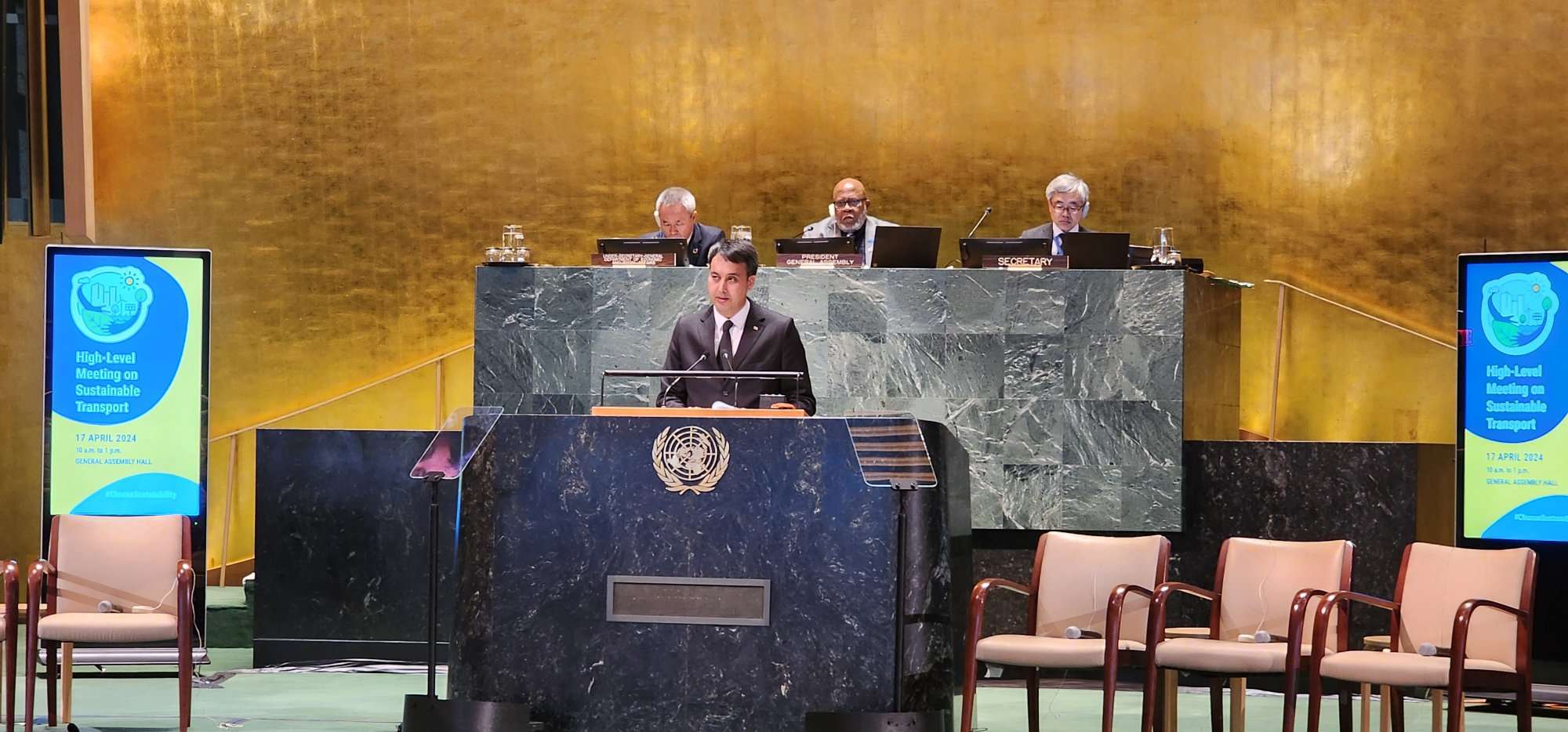The High-Level Meeting on Sustainable Transport took place on Wednesday, 17 April, as part of Sustainable Development Week at the 78th session of the UN General Assembly.
The high-level meeting in New York discussed sustainable and effective solutions to improve the balance between the economic, social and environmental aspects of sustainable transport to fully harness the benefits of sustainable transport to accelerate the implementation of the 2030 Agenda for Sustainable Development.
Batyr Annaev, Chairman of the Turkmendenizderyayollary Agency (Turkmen Water and River Communications) of the Agency of Transport and Communications under the Cabinet of Ministers of Turkmenistan, spoke from the UN rostrum.
Recalling that, on the initiative of Turkmenistan, at the 77th session of the UN General Assembly a resolution declaring November 26 as World Sustainable Transport Day was adopted, he noted that this decision emphasizes the exceptional importance of transport on a global scale.
The choice of date is not accidental - on November 26, 2016, the first UN Global Conference on Sustainable Transport was held at a high level in Ashgabat.

A significant component of the national transport strategy has become the Program for the Development of Transport Diplomacy of the President of Turkmenistan for 2022-2025, which defines the goals of strengthening the capacity of transport systems and international cooperation in this area.
Turkmenistan is a party to 12 international transport conventions. on the initiative of the Turkmen side, over the past 10 years, the UN General Assembly has adopted 4 resolutions on the role of transport and transit corridors, the need for interaction between all modes of transport to ensure stable and reliable international transport and achieve the Sustainable Development Goals. And in the resolution “Strengthening links between all modes of transport to achieve sustainable development,” the UN proclaimed the UN Decade of Sustainable Transport (2026- 2035).
Turkmenistan pays special attention to participation in the creation of such international transport corridors as Lapis Lazuli, connecting Afghanistan, Turkmenistan, Azerbaijan and Georgia, transport corridors Uzbekistan- Turkmenistan-Iran-Oman-Qatar, North-South and TRACECA. These projects contribute to the development of international trade and overall economic growth in the region, Annaev noted. In recent years, Turkmenistan has invested vigorously in the diversified development of its transport system, including rail, road, air and sea routes, which today allows the country to effectively integrate into global transport networks. More than 5 thousand kilometers of steel roads provide reliable connections between the regions of the country, improving transit opportunities and stimulating economic growth. The Turkmenbashi International Seaport, with a capacity of 17 million tons per year, provides access to global sea routes and enhances the importance of maritime transport in trade.
The development of air infrastructure, including the construction of new airports and the renovation of existing ones, also contributes to the growth of cargo and passenger traffic. With the opening of the seventh airport in Jebel City, national airports will increase their capacity by 3,800 passengers per hour, creating additional opportunities for the development of tourism, commercial and cultural exchanges.
Currently, large-scale construction of the Ashgabat-Turkmenabat highway with a length of 600 km is ongoing in Turkmenistan. Its first section Ashgabat-Tejen - which is 203 km - has already been launched in 2021.
The chairman of the agency said that today, with the participation of President of Turkmenistan Serdar Berdimuhamedov, the grand opening of the second section of the Tejen-Mary highway with a length of 109 km took place.

The country is intensively introducing information technologies to manage traffic flows. These are traffic monitoring and control systems, electronic tickets, mobile applications for route planning, and so on. All this sets new standards for convenience, speed and transparency.
The speaker noted that the share of transport and communications in the country's GDP in 2022 was 8.8%, which is a significant increase compared to 7.4% in 2015. At the same time, as part of the decarbonization course, Turkmenistan is promoting the electrification of transport: public electric buses and electric taxis have been successfully introduced in the new city of Arkadag.
The high-level meeting discussed effective solutions to improve the balance between economic, social and environmental aspects of sustainable transport development. In addition to the ministerial segment, the meeting included an interactive multi-stakeholder panel that explored ways to improve intermodal transport connectivity and develop socially inclusive and environmentally friendly transport.
ORIENT news




